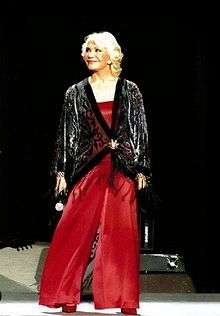Laïko
Laïkó (Greek: λαϊκό τραγούδι, pronounced [laiˈko traˈɣuði], "song of the people"; "popular song", pl: laïká [tragoudia]) is a Greek music genre composed in Greek language in accordance with the tradition of the Greek people. Also called folk song or urban folk music (Gr: αστική λαϊκή μουσική or λαϊκά τραγούδια laïká tragoudia), in its plural form is a Greek music genre which has taken many forms over the years. Laïkó followed after the commercialization of Rebetiko music. It is strongly dominated by Greek folk music and it is used to describe Greek popular music as a whole. When used in context, it refers mostly to the form it took in the period from the 1950s to the 1980s.
| Music of Greece | |
|---|---|
 | |
| General topics | |
| Genres | |
| Specific forms | |
| Media and performance | |
| Music awards |
|
| Music charts | |
| Music festivals | |
| Music media |
|
| Nationalistic and patriotic songs | |
| National anthem | "Hymn to Liberty" |
| Regional music | |
| Related areas | Cyprus, Pontus, Constantinople, South Italy |
| Regional styles |
|
| Laïko | |
|---|---|
| Stylistic origins | |
| Cultural origins | 1960s, Greece |
| Typical instruments | |
| Derivative forms | |
| Subgenres | |
Rebetiko and Elafró tragoudi
Until the 1930s the Greek discography was dominated by two musical genres: the Greek folk music (Demotiká) and the Elafró tragoudi (literally: "light[weight] song"). The latter was represented by ensembles of singers/musicians or solo artists like Attik and Nikos Gounaris. It was the Greek version of the international popular music of the era. In the 1930s the first rebetiko recordings had a massive impact on Greek music. As Markos Vamvakaris stated "we were the first to record laïká (popular) songs". In the years to follow this type of music, the first form of what is now called laïkó tragoudi, became the mainstream Greek music.
Elafró tragoudi artists
1920s–1950s
- Attik
- Nikos Gounaris
- Tony Maroudas
- Giorgos Mouzakis
- Michalis Souyioul
- Danaë Stratigopoulou
- Sofia Vembo
Rebetiko artists
1930s–1960s
Classic laïkó
Classic laïkó as it is known today, was the mainstream popular music of Greece during the 1960s and 1970s. Laiko music evolved from the traditional Greek music of the ancient and the medieval Greek era and was established until the present day.[1][2] Laïkó was dominated by singers such as Nikos Xanthopoulos and composers such as Mimis Plessas. Among the most significant songwriters and lyricists of this period are George Zambetas and the big names of the Rebetiko era that were still in business, like Vassilis Tsitsanis and Manolis Chiotis. Many artists combined the traditions of éntekhno and laïkó with considerable success, such as the composers Stavros Xarchakos and Mimis Plessas.
Artists
1960s–80s
|
Composers:
|
Singers:
|
Contemporary laïkó
Contemporary laïkó (σύγχρονο λαϊκό) (also called Modern laïkó or laïko-pop) can be called in Greece the mainstream music genre, with variations in plural form as Contemporary laïká. Along with Modern laïká in Greek is currently Greece's mainstream music genre. The main cultural Greek dances and rhythms of today's Greek music culture laïká are Nisiotika, Syrta, Antikristos, Rebetika, Hasapiko, Zeibekiko, Kalamatianos, Kangeli and Syrtaki.
The more cheerful version of laïkó, called elafró laïkó (ελαφρολαϊκό – elafrolaïkó, "light laïkó") and it was often used in musicals during the Golden Age of Greek cinema. The Greek Peiraiotes superstar Tolis Voskopoulos gave the after-modern version of Greek Laïko (Ελληνικό Λαϊκό) listenings. Many artists have combined the traditions of éntekhno and laïkó with considerable success, such as the composers Mimis Plessas and Stavros Xarchakos.
Contemporary laïká emerged as a style in the early 1980s. An indispensable part of the contemporary laïká culture is the písta (Greek: πίστα; pl.: πίστες), "dance floor/venue". Night clubs at which the DJs play only contemporary laïká where colloquially known on the 90s as ellinádhika. Modern laiko is mainstream Greek laïkó music mixed in with modern Western influences, from such international mainstream genres as pop music and dance. Renowned songwriters or lyricists of contemporary laïká include Alekos Chrysovergis, Nikos Karvelas, Phoebus, Nikos Terzis, Giorgos Theofanous and Evi Droutsa.
Terminology
In effect, there is no single name for contemporary laïká in the Greek language, but it is often formally referred to as σύγχρονο λαϊκό [ˈsiŋxrono laiˈko], a term which is however also used for denoting newly composed songs in the tradition of "proper" Laïkó; when ambiguity arises, σύγχρονο ("contemporary") λαϊκό or disparagingly λαϊκο-πόπ (laïko-pop, "folk-pop", also in the sense of "westernized") is used for the former, while γνήσιο ("proper, genuine, true") or even καθαρόαιμο ("pureblood") λαϊκό is used for the latter. The choice of contrasting the notions of "westernized" and "genuine" may often be based on ideological and aesthetic grounds. Laiko interacted more westernized sounds in the late of 2000s.[3] The term modern laïká comes from the phrase μοντέρνα λαϊκά (τραγούδια), modern songs of the people.
Criticism
Despite its immense popularity, the genre of contemporary laïká (especially laïkο-pop) has come under scrutiny for "featuring musical clichés, average singing voices and slogan-like lyrics" and for "being a hybrid, neither laïkó, nor pop".[4]
Artists
(1980s–2000s)
- Anna Vissi
- Elli Kokkinou
- Vasilis Karras
- Antonis Remos
- Natassa Theodoridou
- Helena Paparizou
- Notis Sfakianakis
- Kostas Makedonas
- Christos Nikolopoulos (composer)
- Thodoris Ferris
- Dimitris Basis
- Yiannis Parios
- Giannis Ploutarhos
- Maria Iakovou
- Katy Garbi
- Despina Vandi
- Peggy Zina
- Giorgos Mazonakis
- Paschalis Terzis
Notes
- "Greek Traditional Music": Ινστιτούτο έρευνας μουσικής και ακουστικής - Institute for research on music and acoustics.
- Samuel Baud-Bovy, Δοκίμιο για το Ελληνικό Δημοτικό Τραγούδι, 3rd edition, Πελοποννησιακό Λαογραφικό Ίδρυμα, Ναύπλιο: 1966, pp. 1–13. (Υπάρχει μια συνεχής εξέλιξη από την αρχαία Ελληνική μουσική έως και το δημοτικό τραγούδι, η οποία μαρτυρείται, εκτός από τη γλώσσα, στο ρυθμό, τη δομή και τη μελωδία).
- http://www.rebetiko.gr/history.php The history of laiko and rebetiko song – Η ιστορία του λαϊκού τραγουδιού.
- http://www.e-orfeas.gr/singing/editorial/854-article854.html Article by Tasos P. Karantis on e-Orfeas.gr

